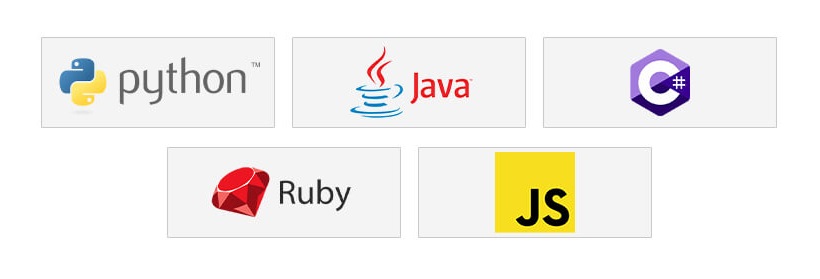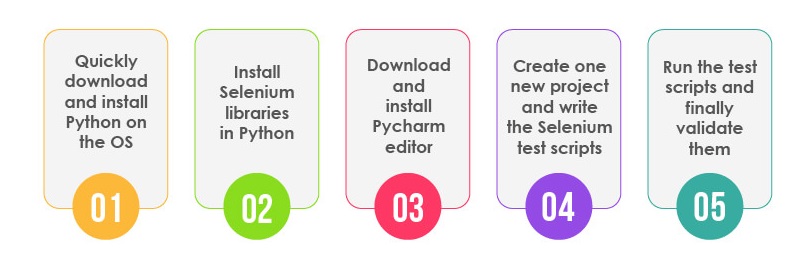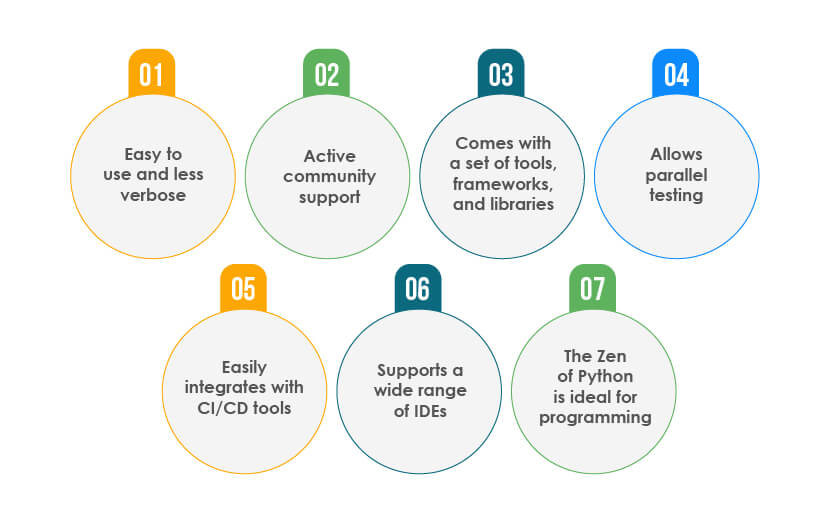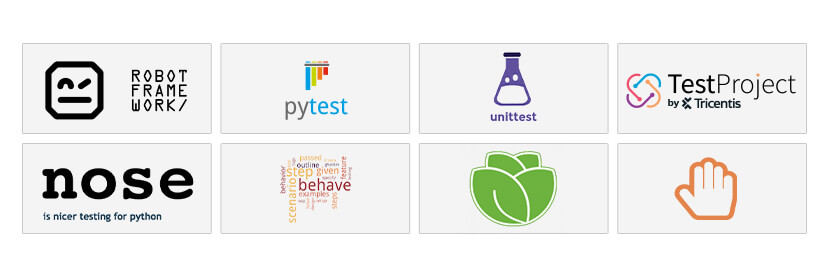Recommended Blogs
An Overview of Automation Testing Using Python

Today’s digital businesses need high-quality software in less time to deliver a great customer experience (CX). Therefore, before the software is released into the market, it goes through rigorous testing phases, which consumes a lot of time. But, for businesses to reach the market early, the software testing cycles need to be shortened, and it becomes possible adopting automation testing.
Content
- What is automation testing using Python?
- What are the best programming languages preferred for automation testing?
- Python’s importance for automated software testing
- How to configure using Python?
- Why do testers prefer automated software testing with Python?
- Python testing frameworks for automation testing
- Conclusion
What is automation testing using Python?
Automation testing is a software testing method in which automated tools, frameworks, and scripts are used for testing the software. In this software testing technique, reusable test scripts are developed to test the app functionality, thus reducing the overall regression time and helping with faster software releases. Leveraging test automation reduces regression time and quality releases within the testing life cycle.
Various programming languages are used for creating automated test scripts, including Python, C#, Ruby, Java, etc. But, Python is a simple-to-use programming language, easy to learn, and has more resemblance to the English language. Moreover, Python is an open-source language with an approachable syntax that’s easy to read and understand relative to other programming languages. It is more preferred by testers for automated software testing, while other programming languages can also be used for automation testing.
What are the best programming languages preferred for automation testing?

1. Python:
It is an open-source programming language for test automation of web and desktop applications, machine learning, network servers, media tools, and test automation. It is an easy-to-use language and comes with vast library support.
2. Java:
This is one of the most popular programming languages for test automation. It works on the WORA (Write Once, Run Anywhere) principle, making cross-platform testing very easy. It comes with complete test frameworks, packages, and information sources.
3. C#:
It is an object-oriented programming language used to develop web and desktop applications. It is also one of the most widely used programming languages for test automation. It is best suited for windows, android, and iOS applications/platforms.
4. Ruby:
It is an open-source programming language; this language is slowly gaining attention from testers worldwide. This language is known for its simplicity and productivity and is easy to use, making it one of the easy-to-use programming languages.
5. Java Script:
It is another commonly used programming language for test automation and front-end development. One of the major reasons why testers prefer Java Script is that it supports shift-left methodologies where developers are involved in test code development.
But, Python is the most preferred language among all the above mentioned.
Python’s importance for automated software testing
1. This language has many built-in testing frameworks, such as Pytest, Robot, etc., which ensures faster debugging and the creation of faster workflows
2. It is an interpreted language and implements the code line by line, which makes the debugging easy
3. As it is a cross-platform language, it can run on different platforms like Windows, Linux, and Mac
4. It can also be easily implemented with other programming languages such as C, C++, JAVA, etc.
How to configure using Python?

1. Quickly download and install Python on the OS
2. Install Selenium libraries in Python
3. Download and install Pycharm editor
4. Create one new project and write the Selenium test scripts
5. Run the test scripts and finally validate them
Why do testers prefer automated software testing with Python?

1. Easy to use and less verbose:
Python is comparatively easy to learn and use language. It is best suggested for beginners who want to learn software programming languages.
2. Active community support:
Python comes with active community support that offers technical help at no cost, making it the most preferred language for test automation.
3. Comes with a set of tools, frameworks, and libraries:
Python comes with a vast library of frameworks. PyUnit or Unittest is a default framework in Python for test automation. Apart from this, Python supports various other frameworks for test automation, such as PyTest, Behave, Robot, Lettuce, Nose2, Testify, etc.
4. Allows parallel testing:
Python supports parallel testing across browsers and operating systems for test automation, making it one of the most preferred languages for automation testing by testers.
5. Easily integrates with CI/CD tools:
The Python ecosystem contains tools that can be easily integrated with CI/CD tools like Jenkins, which is one of the added advantages of Python.
6. Supports a wide range of IDEs:
Python comes with a wide range of IDEs for test automation, and one of the most preferred IDE for test automation is PyCharm.
7. The Zen of Python is ideal for programming:
According to Wikipedia, The Zen of Python is a collection of 19 “guiding principles” for writing computer programs that influence the design of the Python programming language. These guidelines contain basic rules that testers can make automated test scripts very efficient and conduct test automation seamlessly.
Python testing frameworks for automation testing

1. Robot Framework:
It is an open-source test automation framework used for user acceptance testing, acceptance test-driven development (ATDD), and
2. Pytest:
It is an open-source web automation testing framework that supports unit testing, functional testing, API testing, etc. Pytest can be used for simple as well as complex functional test cases. It supports the Test Driven Development approach and supports parallel test execution through the pytest-xdist plugin. Pytest is compatible with other Python testing frameworks such as Unittest or Pyunit.
3. Unittest or PyUnit:
It is a default Python testing framework part of the Python standard library. Unittest is a derivative of xUnit framework and has some similarities with it. It comes with an easy installation and Configuration option, making UnitTest Framework one of the most preferred Python Unit testing frameworks.
4. TestProject:
It is an open-source complete automation testing framework. Testers can easily develop test cases for mobile, web, or generic automation using this test framework. It is a single-agent executable framework and comes with third-party libraries that are needed to develop and execute test automation for web, mobile and generic. It generates free automatic reports in PDF and HTML formats
5. Nose2:
It is a Python-based unit testing framework that can be used to run DocTests and UnitTests. Nose2 is a Domain-Specific Language (DSL) for writing functional tests and has an inbuilt plugin ecosystem that makes testing simple and faster.
6. Behave:
It is one of the most widely used Python behavior-driven development testing frameworks. This framework allows testers to write test cases in an easy and understandable language and has good documentation support.
7. Testify:
Testify is a replacement for Unittest and Nose. It has more advanced features than Unittest. This framework can be used for unit testing, system testing, and integration testing.
8. Lettuce:
It is a Python behavior-driven development framework based on Cucumber. It supports the Gherkin language. Testers with a non-technical background can easily use this language to create automated tests.
Conclusion
In earlier days, the testers were expected to know complex programming languages to perform software testing. Today, various programming languages are available and by leveraging them today’s testers can execute automated tests with much ease.
Python is one such programming language for automated software testing, which is easy to learn and use. It makes automated software testing easier, even for testers that have just started their journey in software testing. If you are looking for Automation testing using Python, speak to our experts and we can help.
FAQs
-
Automation testing is a software testing method in which automated tools, frameworks, and scripts are used for testing the software. In this software testing technique, reusable test scripts are developed to test the app functionality, thus reducing the overall regression time and helping with faster software releases.
-
Quickly download and install Python on the OS, Install Selenium libraries in Python, Download and install Pycharm editor, Create one new project and write the Selenium test scripts, Run the test scripts and finally validate them
-
1. Robot Framework
2. Pytest
3. Unittest or PyUnit
4. TestProject
Discover more
Stay Updated
Subscribe for more info
